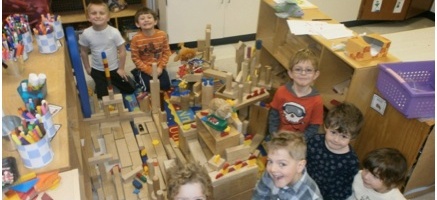Early childhood officials at the U.S. Department of Education, some who should know better, have apparently concluded (as described in this Ed Week article), that they were making little kids do things too over-the-top to be early childhood ready—like giving four-year-olds basic sight word spelling tests and getting them to count to 20 in their daycare centers.
My guess is, even if these higher ups are cloistered in DC, they are probably also hearing the mounting drumbeat of dissatisfaction by parents across the country. These parents are sick of testing. And they are especially tired of kindergartners being made to toe the line for a rotten economy. They just no longer buy into this ridiculous rigor speech.
Ms. Doggett the USDOE early childhood expert, says they are “aware that people are fed up with testing. We want to make sure people don’t get scared because you use the word ‘assessment.’ What we’re talking about is measuring progress by being a keen observer, and helping teachers know where their kids are.” And she says, “We never want children or programs punished.” That is exactly what she should say, because that is exactly what has been done.
So now Race to The Top officials race themselves to make what they think will look like new kinder and gentler assessments. However, they, or their directors, are so tied up in manipulative micro-management that they just can’t bear to allow children the complete freedom of play and their teachers to jot down notes and do regular observations.
No. They need to keep a handle on the new testing…just like they controlled the old testing. Only now it looks kind of like kids get to play. Just know it is staged. The play is orchestrated. And when that happens it really isn’t play at all. Make no mistake, while children move around appearing to play, the reality is some is “spontaneous” but most is “carefully planned and scripted.”
This testing isn’t really different than the old testing in what it achieves. It is still the old rubrics and aggregated data collection that can be tailored into specific instruction—sight unseen. I mean, just when do kindergarten teachers get to do actual teaching? How much time after all the data collecting do they have to do the things that matter? And how will they be evaluated if little Timmy can’t cut paper or tie his shoe?
This is, after all, still all about President Obama’s RTT initiative and Early Learning Challenge grants. If you push an ambitious program for early childhood you will get lots of money. If you don’t you won’t. Has anything changed about that? I don’t think so.
Oh what’s a poor cash-strapped school district to do? The answer is simple to administrators, many who now never worked with young children. Keep testing!
Some teachers will say that they are now getting it right when it comes to age-appropriateness. Excuse my skepticism. Isn’t what they said before?
The fact is, while the advocates for the new testing might or might not believe in such assessment, it is still manipulated and controlling, like the people at the top like—the kind of educating they think is good—and it is still all about the assessment.
What’s especially insidious about this kind of testing is that it permeates the whole curriculum. How do parents opt out? Well I suppose they could ask the teacher not to collect the data. Or they could ask how the data is being used. Parents hate big data almost as much as they hate testing. In fact, the two go hand-in-hand.
Here are some key points indicating nothing has changed:
- College professors still obsess over writing more assessment.
- WestEd and Johns Hopkins (teacher training) are still creating assessments. Didn’t they do the old ones too?
- Kindergarten teachers still spend time collecting data on children.
- Kindergartners are still doing plenty of worksheets.
- There is still too much of an emphasis on testing.
So even though there is the facade that it looks better—it isn’t. They aren’t going to give kindergartners a real break from testing. They aren’t going to let them play like kindergartners deserve to play. They just can’t let go of the assessment obsession. It is who and what they are all about.

This applies to Pre-K also!